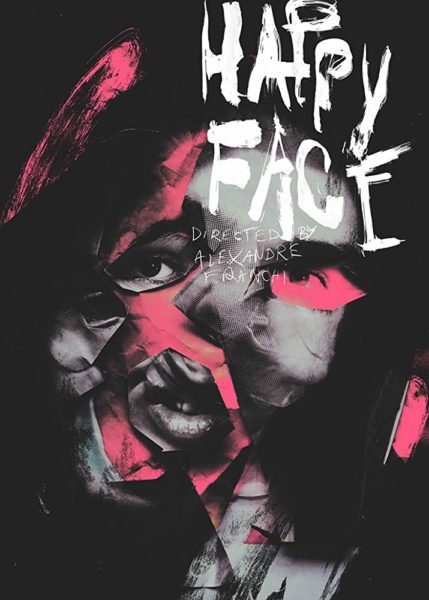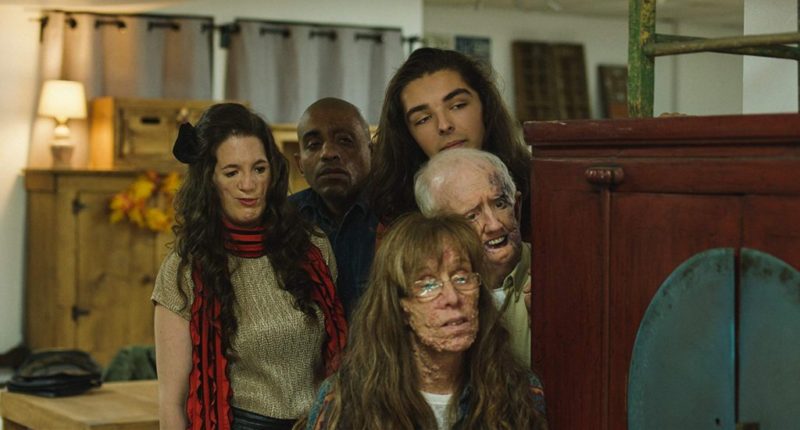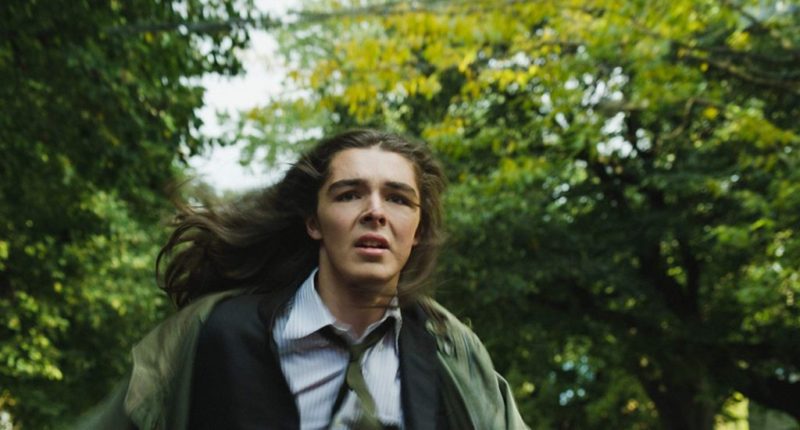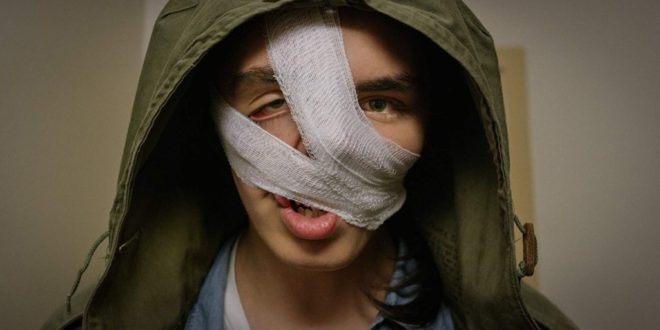We live in a world consumed with outward appearances. What makes a person beautiful? Turn on the television, or page through a magazine, we’re bombarded incessantly with toned bodies and gorgeous faces trying to sell us everything we need to look our best on the outside. From fashion and makeup to dieting and exercise, the obsession with physical appeal is EVERYWHERE. But true beauty is so much more than just skin-deep. Some of the most majestic, radiant souls I know may never grace the covers of the latest fashion magazines, but it doesn’t diminish their attraction in the least, and some of the kindest, most gracious hearts on earth struggle daily to hold it all together.

Ten years after the release of his 2009 film, The Wild Hunt, Writer/Director Alexandre Franchi’s film, Happy Face (2019), looks to assault our beauty-obsessed culture head-on. This at times boldly confrontational film tackles both inward and outward beauty in a direct way. It’s not always handled gracefully, and the results can be a bit mixed, but it ultimately resolves in a surprisingly emotional and poignant film.
Happy Face has a tremendous amount of depth and layers, with a lot of underlying storylines of its many characters, but the core storyline here is that of Stanislas (Robin L’Houmeau: Fear: An Allegory on Life and Self-Detriment 2019), a 19 year-old finance student living with his cancer-stricken mother. He clearly feels inadequate and ill-prepared to deal with his mother’s aggressive illness. In his desperation, he dons a disguise and begins attending a support group for facially disfigured people, hoping it will better prepare him for his mom’s inevitable changes as the cancer progresses.
It’s through the support group that we get to know our other characters. Each have their own unique stories, but they’ve all felt the bitter sting of being ostracized and rejected by society for their appearances. The group’s leader, Vanessa (Singer Debbie Lynch-White: La Bolduc 2017), a young woman who herself has dealt with lifelong mockery over her weight, is doing all she can to help the group to overcome their social fears, but is also struggling to work through her own issues, and much of her “treatment” seems to result in embarrassing mishaps. Once Stan’s deception is discovered, he attempts to win back the trust of the group by suggesting a more unconventional form of therapy: fighting back, weaponizing their “ugliness” to make their bullies uncomfortable instead.

Stan’s audacious plan seems to work, helping his cohorts confront their fears and rediscover their confidence. But while his “Fuck the world” attitude is bringing a lift to their lives, his own is falling apart. It seems he’s just using the group as his escape from dealing with his withering away mother. His over-the-top methods of championing and inspiring his newfound friends is to compensate for his utter avoidance of his mom’s condition, as her days are quickly running short. When this truth becomes clear to Vanessa and the group, they finally force him to face his own fears, leading to some of the most powerful, touching scenes of the film.
Happy Face proved to be a unexpected surprise. It’s delivery can be a bit awkward at times, and I’m not sure it makes all its points to full effect, but the film proves to be an extremely emotional ride. As someone who has dealt with a great deal of mockery and bullying along with considerable body issues and dysmorphia, this film really hits the feels hard. I also know the pain of losing a parent, with constant feelings of inadequacy during my mom’s treatment and in the aftermath of her passing, so Happy Face definitely struck a deep emotional chord. The bluntness of the script can be a bit jolting at times, but honestly, I find that refreshing. The subject matter here is extremely relatable to us all on some level, and while it can be blunt and direct at times, I feel it has just the right amount of sensitivity and restraint. It’s real, sometimes harsh, but never overpowering. This film isn’t going to emotionally bludgeon you. The characters have great depth and are extremely well-developed. We really grow to care for these people on this journey, in spite of their flaws and struggles.
Happy Face was slow to get rolling in the beginning, and there were a few moments where it felt like the film dragged on a bit. I also felt that the ending left a lot to be desired. While Stan was able to find some peace and closure with his mom, the ending was the one point that felt almost rushed. However, considering the emotional weightiness of a struggling loved one, maybe brisk was the appropriate way to go. Otherwise, the execution of Happy Face was excellent. I can honestly say I’ve never seen anything quite like it.

Final Thoughts:
Happy Face proved a pleasant surprise. The messages are loud and clear, and they’re delivered with a perfect blend of blunt realness and tender sensitivity. For anyone who has dealt with bullying or grief for a loved one, you’ve will have a lot to digest here. This film tugs at the heartstrings with a cathartic experience, but doesn’t leave you feeling utterly crushed or overwhelmed.
While I don’t know that it’s a film I’d revisit often, Happy Face was a thoroughly enjoyable watch, something different and off the beaten path. It played this past Friday, November 22nd at the 2019 Blood in the Snow Film Festival in Canada, where the crowd was treated to something truly unique and not easily forgotten. So, if you’ve ever felt pushed around for being different, put on a Happy Face and check out this film whenever the chance arises.
 PopHorror Let's Get Scared
PopHorror Let's Get Scared




